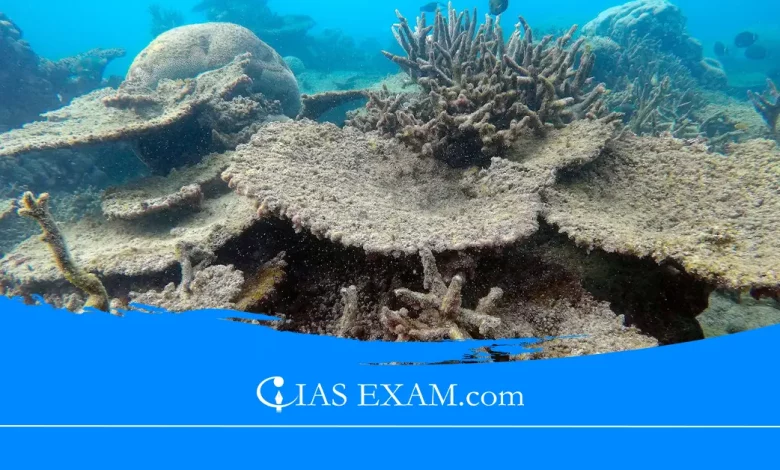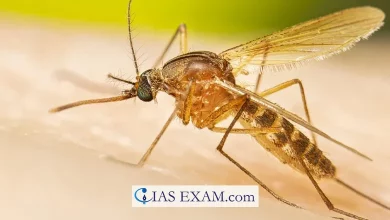Daily Current Affairs for UPSC
Fourth Mass Coral Reef Bleaching
Syllabus- International Relations [GS Paper-2]

Context
As per the U.S. NOAA, the world is on the verge of a fourth mass coral bleaching event which could see wide swathes of tropical reefs die.
About Corals and Coral Reefs
- Corals are animals (polyps), which live in a symbiotic relationship with tiny algae referred to as zooxanthellae.
- These algae offer the corals with meals and oxygen, and in go back, the corals provide them with a secure region to stay.
- Coral reefs are limestone systems shaped by lots of tiny coral animals and are found in tropical climates.
What is Coral Bleaching and Why is it a Cause for Concern?
- When corals are exposed to challenging situations, which includes high temperatures, pollutants, or changes within the water’s chemistry, they expel the zooxanthellae.
- Without them, the coral loses its color and turns white, consequently the term “bleaching.” Corals can’t live very long in this nation.
- Coral bleaching doesn’t always suggest the end of the reef. If the stressor is eliminated in time, the zooxanthellae can come back and the corals can recover.
- Coral reefs offer a domestic and a source of food for limitless species of fish and different marine creatures.
- They also guard coastlines from erosion and storms, and play a crucial role in regulating the Earth’s weather with the aid of soaking up and storing carbon dioxide.
- Also, coral reefs are a lovely display of biodiversity and herbal beauty, and their loss could be a tragedy for future generations.
- When coral reefs go through, so do the ecosystems and the human beings that rely upon them.
What are the Findings of the National Oceanic and Atmospheric Administration (NOAA)?
- The world is at the verge of a fourth mass coral bleaching occasion (after 1998, 2010 and 2014).
- For an occasion to be deemed global, extensive bleaching needs to occur in three ocean basins – the Atlantic, Pacific and Indian.
- The final global mass coral bleaching event ran from 2014 to 2017, during which period the Great Barrier Reef misplaced nearly a 3rd of its corals.
- Preliminary results propose that approximately 15% of the sector’s reefs saw huge coral die-offs in this event.
- This year is growing to be even worse. For instance, following the Northern Hemisphere summer last year, the Caribbean registered its worst coral bleaching on record.
- Coral bleaching is frequently tied to the evidently occurring El Nino climate phenomenon which leads to warmer ocean waters.
- The world additionally just registered (because of climate change) its first year period with an average temperature over 1.5 degrees Celsius (2.7 levels Fahrenheit) above pre business ranges.
- A rise of 1.5C is assumed to be the tipping factor for mass coral die-offs, with scientists estimating that 90% of the world’s corals might be misplaced.
Source: The Hindu
UPSC Mains Practice Question
Q.Assess the impact of global warming on the coral life system with examples. (2019)





.png)



